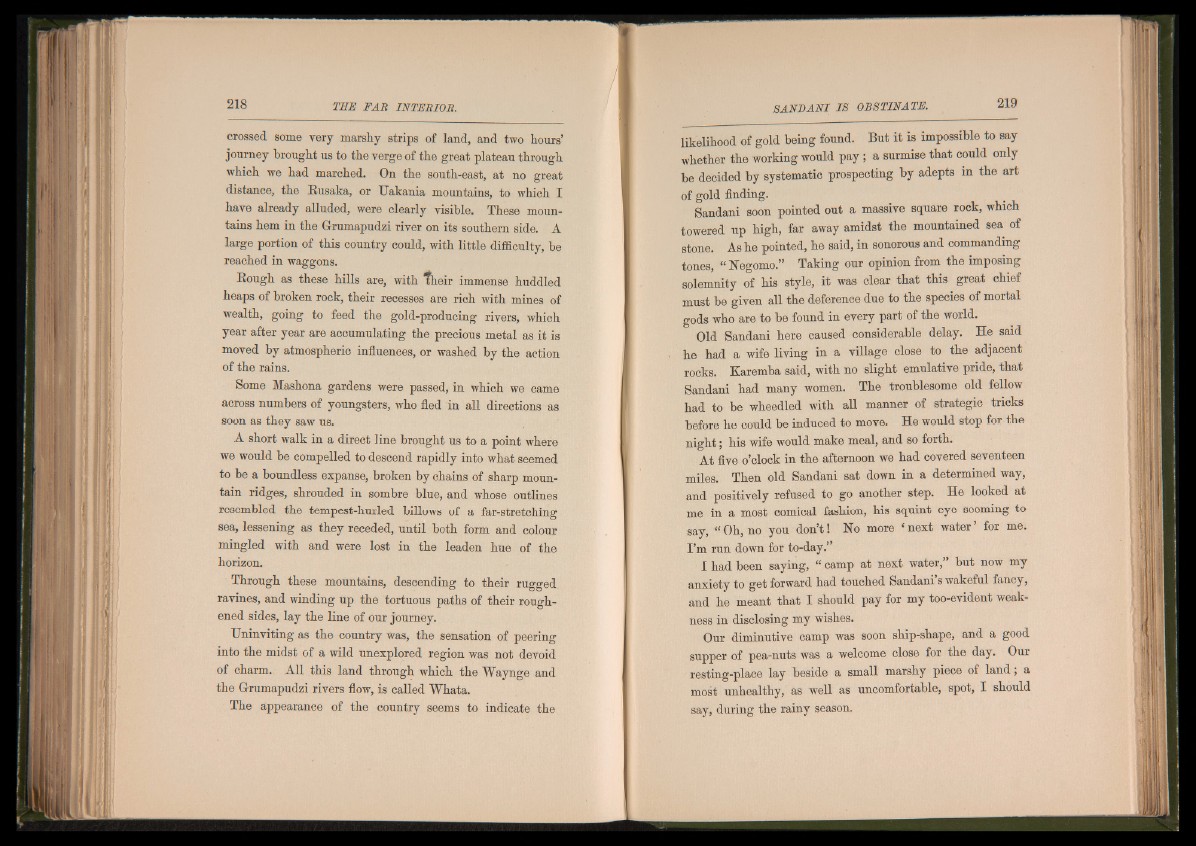
crossed some very marshy strips of land, and two hours’
journey brought us to the verge of the great plateau through
which we had marched. On the south-east, at no great
distance, the Rusaka, or Uakania mountains, to which I
have already alluded, were clearly visible. These mountains
hem in the Grrumapudzi river on its southern side. A
large portion of this country could, with little difficulty, be
reached in waggons.
Rough as these hills are, with ^heir immense huddled
heaps of broken rock, their recesses are rich with mines of
wealth, going to feed the gold-producing rivers, which
year after year are accumulating the precious metal as it is
moved by atmospheric influences, or washed by the action
of the rains.
Some Mashona gardens were passed, in which we came
across numbers of youngsters, who fled in all directions as
soon as they saw us.
A short walk in a direct line brought us to a point where
we would be compelled to descend rapidly into what seemed
to be a boundless expanse, broken by chains of sharp mountain
ridges, shrouded in sombre blue, and whose outlines
resembled the tempest-hurled billows of a far-stretching
sea, lessening as they receded, until both form and colour
mingled with and were lost in the leaden hue of the
horizon.
Through these mountains, descending to their rugged
ravines, and winding up the tortuous paths of their roughened
sides, lay the line of our journey.
Uninviting as the country was, the sensation of peering
into the midst of a wild unexplored region was not devoid
of charm. All this land through which the Waynge and
the Grumapudzi rivers flow, is called Whata.
The appearance of the country seems to indicate the
likelihood of gold being found. Rut it is impossible to say
whether the working would pay ; a surmise that could only
be decided by systematic prospecting by adepts in the art
of gold finding.
Sandani soon pointed out a massive square rock, which
towered up high, far away amidst the mountained sea of
stone. As he pointed, he said, in sonorous and commanding
tones, “ Negomo.” Taking our opinion from the imposing
solemnity of his style, it was clear that this great chief
must be given all the deference due to the species of mortal
gods who are to be found in every part of the world.
Old Sandani here caused considerable delay. He said
he had a wife living in a village close to the adjacent
rocks. Karemba said, with no slight emulative pride, that
Sandani had many women. The troublesome old fellow
had to be wheedled with all manner of strategic tricks
before he could be induced to move. He would stop for the
n ig h t; his wife would make meal, and so forth.
At five o’clock in the afternoon we had covered seventeen
miles. Then old Sandani sat down in a determined way,
and positively refused to go another step. He looked at
me in a most comical fashion, his squint eye seeming to
say, “ Oh, no you don’t! No more ‘ next water’ for me.
I ’m run down for to-day.”
I had been saying, “ camp at next water,” but now my
anxiety to get forward had touched Sandani’s wakeful fancy,
and he meant that I should pay for my too-evident weakness
in disclosing my wishes.
Our diminutive camp was soon ship-shape, and a good
supper of pea-nuts was a welcome close for the day. Our
resting-place lay beside a small marshy piece of la n d ; a
most unhealthy, as well as uncomfortable, spot, I should
say, during the rainy season.